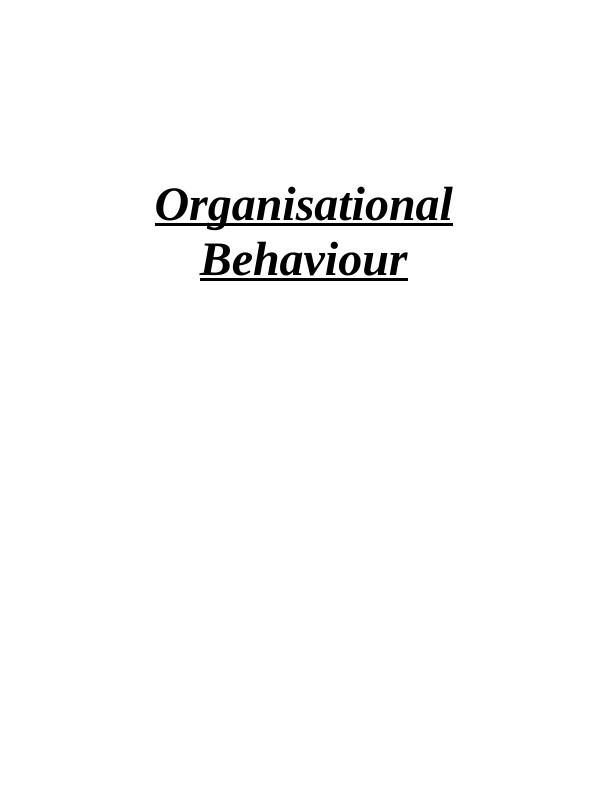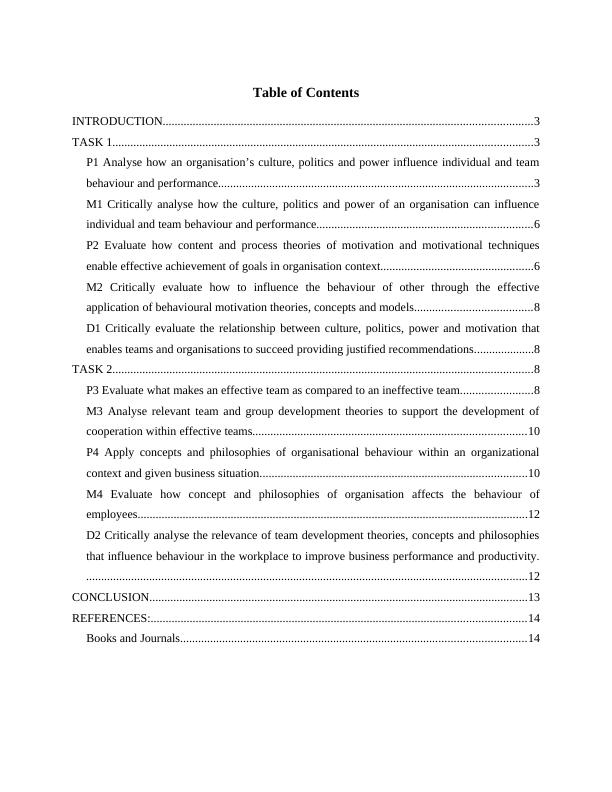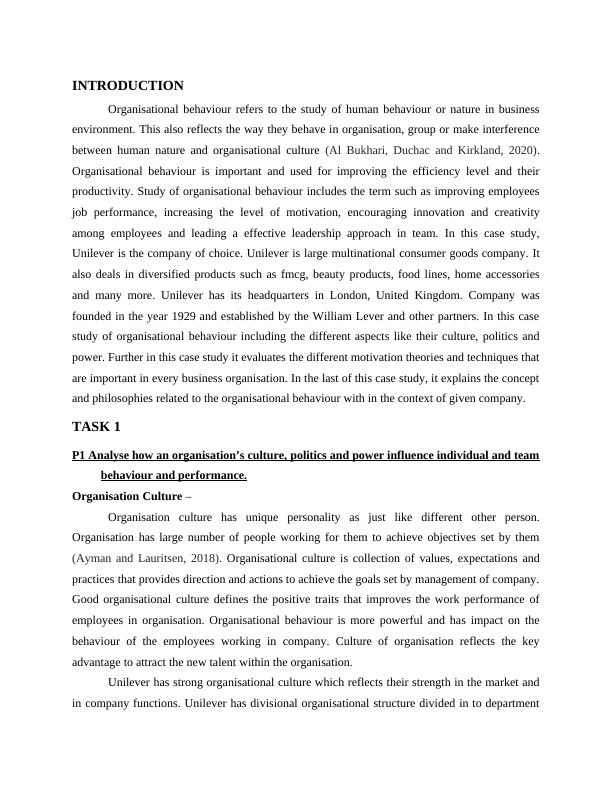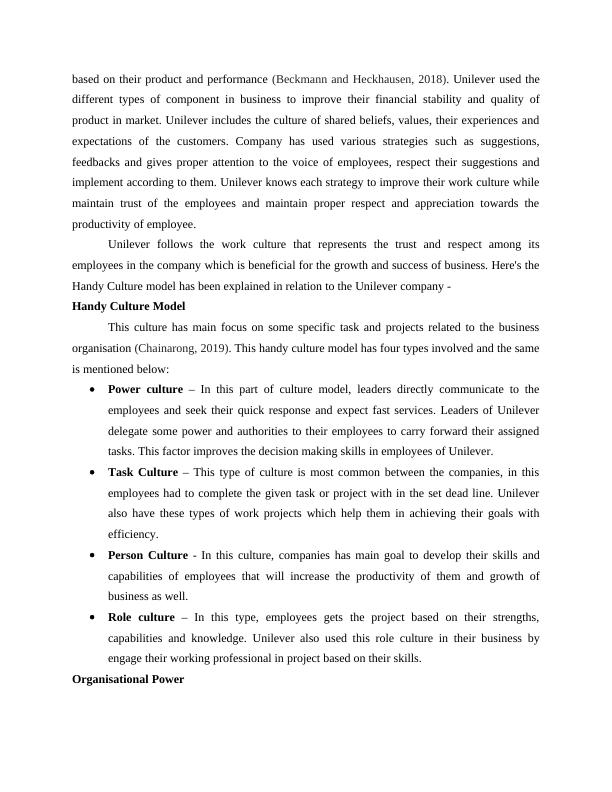Organisational Behaviour: Influence of Culture, Politics, Power, and Motivation on Individual and Team Performance
Added on 2023-06-05
14 Pages4639 Words464 Views
Organisational
Behaviour
Behaviour

Table of Contents
INTRODUCTION...........................................................................................................................3
TASK 1............................................................................................................................................3
P1 Analyse how an organisation’s culture, politics and power influence individual and team
behaviour and performance.........................................................................................................3
M1 Critically analyse how the culture, politics and power of an organisation can influence
individual and team behaviour and performance........................................................................6
P2 Evaluate how content and process theories of motivation and motivational techniques
enable effective achievement of goals in organisation context...................................................6
M2 Critically evaluate how to influence the behaviour of other through the effective
application of behavioural motivation theories, concepts and models.......................................8
D1 Critically evaluate the relationship between culture, politics, power and motivation that
enables teams and organisations to succeed providing justified recommendations....................8
TASK 2............................................................................................................................................8
P3 Evaluate what makes an effective team as compared to an ineffective team........................8
M3 Analyse relevant team and group development theories to support the development of
cooperation within effective teams...........................................................................................10
P4 Apply concepts and philosophies of organisational behaviour within an organizational
context and given business situation.........................................................................................10
M4 Evaluate how concept and philosophies of organisation affects the behaviour of
employees..................................................................................................................................12
D2 Critically analyse the relevance of team development theories, concepts and philosophies
that influence behaviour in the workplace to improve business performance and productivity.
...................................................................................................................................................12
CONCLUSION..............................................................................................................................13
REFERENCES:.............................................................................................................................14
Books and Journals...................................................................................................................14
INTRODUCTION...........................................................................................................................3
TASK 1............................................................................................................................................3
P1 Analyse how an organisation’s culture, politics and power influence individual and team
behaviour and performance.........................................................................................................3
M1 Critically analyse how the culture, politics and power of an organisation can influence
individual and team behaviour and performance........................................................................6
P2 Evaluate how content and process theories of motivation and motivational techniques
enable effective achievement of goals in organisation context...................................................6
M2 Critically evaluate how to influence the behaviour of other through the effective
application of behavioural motivation theories, concepts and models.......................................8
D1 Critically evaluate the relationship between culture, politics, power and motivation that
enables teams and organisations to succeed providing justified recommendations....................8
TASK 2............................................................................................................................................8
P3 Evaluate what makes an effective team as compared to an ineffective team........................8
M3 Analyse relevant team and group development theories to support the development of
cooperation within effective teams...........................................................................................10
P4 Apply concepts and philosophies of organisational behaviour within an organizational
context and given business situation.........................................................................................10
M4 Evaluate how concept and philosophies of organisation affects the behaviour of
employees..................................................................................................................................12
D2 Critically analyse the relevance of team development theories, concepts and philosophies
that influence behaviour in the workplace to improve business performance and productivity.
...................................................................................................................................................12
CONCLUSION..............................................................................................................................13
REFERENCES:.............................................................................................................................14
Books and Journals...................................................................................................................14

INTRODUCTION
Organisational behaviour refers to the study of human behaviour or nature in business
environment. This also reflects the way they behave in organisation, group or make interference
between human nature and organisational culture (Al Bukhari, Duchac and Kirkland, 2020).
Organisational behaviour is important and used for improving the efficiency level and their
productivity. Study of organisational behaviour includes the term such as improving employees
job performance, increasing the level of motivation, encouraging innovation and creativity
among employees and leading a effective leadership approach in team. In this case study,
Unilever is the company of choice. Unilever is large multinational consumer goods company. It
also deals in diversified products such as fmcg, beauty products, food lines, home accessories
and many more. Unilever has its headquarters in London, United Kingdom. Company was
founded in the year 1929 and established by the William Lever and other partners. In this case
study of organisational behaviour including the different aspects like their culture, politics and
power. Further in this case study it evaluates the different motivation theories and techniques that
are important in every business organisation. In the last of this case study, it explains the concept
and philosophies related to the organisational behaviour with in the context of given company.
TASK 1
P1 Analyse how an organisation’s culture, politics and power influence individual and team
behaviour and performance.
Organisation Culture –
Organisation culture has unique personality as just like different other person.
Organisation has large number of people working for them to achieve objectives set by them
(Ayman and Lauritsen, 2018). Organisational culture is collection of values, expectations and
practices that provides direction and actions to achieve the goals set by management of company.
Good organisational culture defines the positive traits that improves the work performance of
employees in organisation. Organisational behaviour is more powerful and has impact on the
behaviour of the employees working in company. Culture of organisation reflects the key
advantage to attract the new talent within the organisation.
Unilever has strong organisational culture which reflects their strength in the market and
in company functions. Unilever has divisional organisational structure divided in to department
Organisational behaviour refers to the study of human behaviour or nature in business
environment. This also reflects the way they behave in organisation, group or make interference
between human nature and organisational culture (Al Bukhari, Duchac and Kirkland, 2020).
Organisational behaviour is important and used for improving the efficiency level and their
productivity. Study of organisational behaviour includes the term such as improving employees
job performance, increasing the level of motivation, encouraging innovation and creativity
among employees and leading a effective leadership approach in team. In this case study,
Unilever is the company of choice. Unilever is large multinational consumer goods company. It
also deals in diversified products such as fmcg, beauty products, food lines, home accessories
and many more. Unilever has its headquarters in London, United Kingdom. Company was
founded in the year 1929 and established by the William Lever and other partners. In this case
study of organisational behaviour including the different aspects like their culture, politics and
power. Further in this case study it evaluates the different motivation theories and techniques that
are important in every business organisation. In the last of this case study, it explains the concept
and philosophies related to the organisational behaviour with in the context of given company.
TASK 1
P1 Analyse how an organisation’s culture, politics and power influence individual and team
behaviour and performance.
Organisation Culture –
Organisation culture has unique personality as just like different other person.
Organisation has large number of people working for them to achieve objectives set by them
(Ayman and Lauritsen, 2018). Organisational culture is collection of values, expectations and
practices that provides direction and actions to achieve the goals set by management of company.
Good organisational culture defines the positive traits that improves the work performance of
employees in organisation. Organisational behaviour is more powerful and has impact on the
behaviour of the employees working in company. Culture of organisation reflects the key
advantage to attract the new talent within the organisation.
Unilever has strong organisational culture which reflects their strength in the market and
in company functions. Unilever has divisional organisational structure divided in to department

based on their product and performance (Beckmann and Heckhausen, 2018). Unilever used the
different types of component in business to improve their financial stability and quality of
product in market. Unilever includes the culture of shared beliefs, values, their experiences and
expectations of the customers. Company has used various strategies such as suggestions,
feedbacks and gives proper attention to the voice of employees, respect their suggestions and
implement according to them. Unilever knows each strategy to improve their work culture while
maintain trust of the employees and maintain proper respect and appreciation towards the
productivity of employee.
Unilever follows the work culture that represents the trust and respect among its
employees in the company which is beneficial for the growth and success of business. Here's the
Handy Culture model has been explained in relation to the Unilever company -
Handy Culture Model
This culture has main focus on some specific task and projects related to the business
organisation (Chainarong, 2019). This handy culture model has four types involved and the same
is mentioned below:
Power culture – In this part of culture model, leaders directly communicate to the
employees and seek their quick response and expect fast services. Leaders of Unilever
delegate some power and authorities to their employees to carry forward their assigned
tasks. This factor improves the decision making skills in employees of Unilever.
Task Culture – This type of culture is most common between the companies, in this
employees had to complete the given task or project with in the set dead line. Unilever
also have these types of work projects which help them in achieving their goals with
efficiency.
Person Culture - In this culture, companies has main goal to develop their skills and
capabilities of employees that will increase the productivity of them and growth of
business as well.
Role culture – In this type, employees gets the project based on their strengths,
capabilities and knowledge. Unilever also used this role culture in their business by
engage their working professional in project based on their skills.
Organisational Power
different types of component in business to improve their financial stability and quality of
product in market. Unilever includes the culture of shared beliefs, values, their experiences and
expectations of the customers. Company has used various strategies such as suggestions,
feedbacks and gives proper attention to the voice of employees, respect their suggestions and
implement according to them. Unilever knows each strategy to improve their work culture while
maintain trust of the employees and maintain proper respect and appreciation towards the
productivity of employee.
Unilever follows the work culture that represents the trust and respect among its
employees in the company which is beneficial for the growth and success of business. Here's the
Handy Culture model has been explained in relation to the Unilever company -
Handy Culture Model
This culture has main focus on some specific task and projects related to the business
organisation (Chainarong, 2019). This handy culture model has four types involved and the same
is mentioned below:
Power culture – In this part of culture model, leaders directly communicate to the
employees and seek their quick response and expect fast services. Leaders of Unilever
delegate some power and authorities to their employees to carry forward their assigned
tasks. This factor improves the decision making skills in employees of Unilever.
Task Culture – This type of culture is most common between the companies, in this
employees had to complete the given task or project with in the set dead line. Unilever
also have these types of work projects which help them in achieving their goals with
efficiency.
Person Culture - In this culture, companies has main goal to develop their skills and
capabilities of employees that will increase the productivity of them and growth of
business as well.
Role culture – In this type, employees gets the project based on their strengths,
capabilities and knowledge. Unilever also used this role culture in their business by
engage their working professional in project based on their skills.
Organisational Power

End of preview
Want to access all the pages? Upload your documents or become a member.
Related Documents
BTEC Level 5 Higher National Diploma in Businesslg...
|34
|9716
|176
Organisational Behaviour: Influence of Culture, Politics, Power, Motivation Theories, and Effective Team Development in Unileverlg...
|12
|4303
|277
Organisational Behaviour: Culture, Politics, Power, Motivation, and Team Effectivenesslg...
|13
|4454
|270
Organisational Behaviour: Influence of Culture, Politics, and Power on Individual and Team Performancelg...
|15
|4753
|247
Organisational Behaviour: Culture, Politics, Power, Motivation, and Team Development at Unileverlg...
|16
|4535
|328
Organisational Behaviour: Influence of Culture, Politics, and Powerlg...
|16
|5275
|72
